Charlie Kirk's Christian Revival: A Tremendous Display of Unbridled State Religion
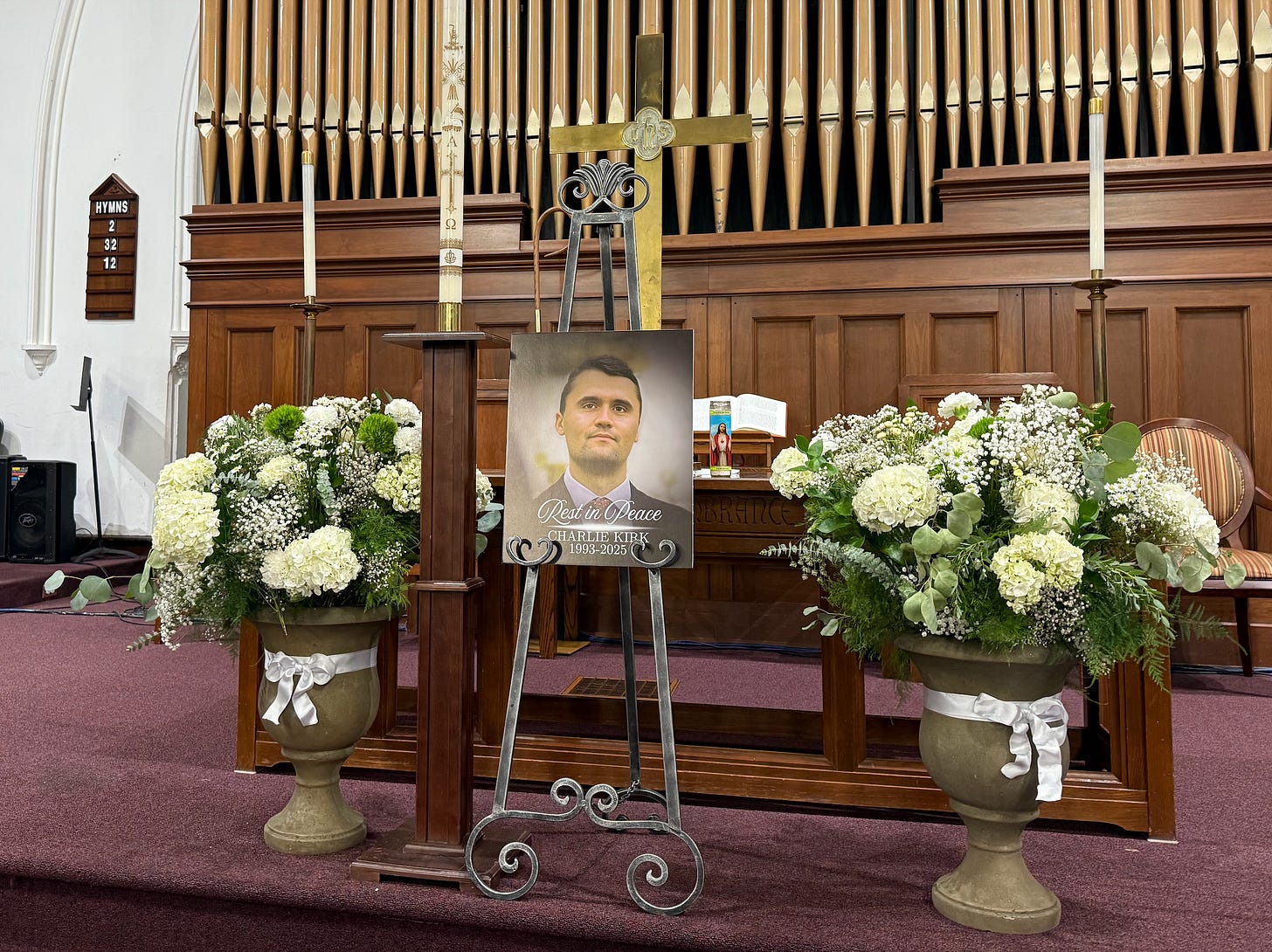
Two recent expressions of “state religion” that had an especially outsized impact were the 2018 funeral of John McCain, held at the aptly-named National Cathedral, as well as the exuberant displays of civil religiosity associated with the George Floyd protests and riots of 2020. I covered both. Now we can most definitely add the Charlie Kirk memorial extravaganza of 2025 — the main event of which was held Sunday at the Arizona Cardinals football stadium. Blessedly, the team had long been scheduled for an away game that day.
No, none of these three events are “the same.” All have distinctive features. All have obvious differences. But they are all unmistakably manifestations of “state religion” — a term whose precise definition readers should not get too hung up on for the time being. It can simply be taken to mean an instance of publicly demonstrative religious expression, carried out with the imprimatur of the state, and through which state-backed political messages are disseminated.
In each of these three cases, there were attempts made to deny that the proceedings were in fact “political.” Such denials often have the counter-intuitive effect of making an event’s political impact all the more resonant. If anyone seriously thinks that John McCain programmed his own funeral with the intent of avoiding any conveyance of “political” messages, that’s absurd, because there has hardly ever been a more thoroughly political creature than John McCain. So of course the highly publicized and star-studded funeral of this lifelong political figure was going to be “political.” That’s just intrinsic to who McCain was. The media, you might recall, certainly had no hesitation in portraying the event as a stark rebuke to Donald Trump from beyond the grave. “John McCain’s Funeral Was the Biggest Resistance Meeting Yet,” gushed one representative New Yorker article. Trump was conspicuously not invited to attend; the program had been organized in advance by McCain for a very clear-cut political purpose. He enlisted George W. Bush and Barack Obama to deliver back-to-back eulogies. While neither attacked Trump directly, their bipartisan homage to McCain was devised as an implicit repudiation of Trump. Here’s what I wrote at the time:
By his own doing, the funeral seemed less for McCain the individual, and more for the increasingly obsolete ideology he so fully embodied — “national greatness,” or the eternal global primacy of the United States. This is the ideology which in its various permutations has sustained American hegemonic power for decades, and has undergirded an elite political culture where simple partisan differences can always be easily overcome when there’s a national initiative to unify around (usually involving military adventurism). If that era hasn’t fully passed, it’s passing, and the process is probably only going to accelerate. That’s why the McCain Holy Week goodbye tour had an ineffable feeling of finality about it, even if it was hard to pinpoint exactly why.
At the ceremony, Meghan McCain didn’t leave much to interpretation when she proclaimed “the America of John McCain has no need to be made great again, because America was always great.” Nobody who was minimally fluent in US political happenings circa 2018 would have understood this as anything other than a rebuke of Trump. And just because Meghan McCain delivered these words in what was technically a eulogy, during what was technically a religious service, did not somehow obviate that the entire event was resolutely political in nature. In fact, the “religious” gloss made the intended political messaging all the more potent. And that’s the unique utility of these events. It’s one thing if a political message gets transmitted at a campaign rally, or on the floor of Congress, or on cable news, or in some other forum where people are already primed to expect political messages. There, the messages can get easily tuned out, or lost in the noise, or eye-rolled into irrelevance. But a funeral? If you can smuggle a political message into a funeral, you have hit the jackpot of political communications. Because that is a setting where everyone is expected to be solemnly reverential and steadfastly respectful — unlike in settings that are more customarily “political.” So you’re going to get a level of messaging-absorption that is hardly attainable anywhere else. If honoring the dead means somberly listening to McCain’s postmortem lecture on the virtues of bipartisan civility and Trump’s corrosion of “norms,” people are going to feel atypically obliged to listen.
The same can be said for the extended Charlie Kirk tributes that just culminated with the stadium-sized Christian worship event on Sunday. I didn’t personally attend the extravaganza in Arizona. But I did go to two much smaller-scale Charlie Kirk events in my surrounding region; one in Bergen County, New Jersey, and another in Rockland County, New York. The latter was held at Clarkstown Reformed Church in West Nyack, and took the form of a more traditional church service. Pastor Richard Hasselbach, who conducted the service, made a point to deny to me afterwards that his event had been “political.” In an interview, he said: “My intent wasn’t political. I designed this entire service to be prayerful. Hymns, scripture readings. My sermon — it really is sort of what God gave me. Because I prepared based on Kirk’s life, and his impact religiously around him. And I think he is the beginning of a New Great Awakening.”
Seriously, no disrespect, but this service on Saturday night could not have been more unambiguously political! MAGA hats were literally scattered in the pews! It was promoted by the Rockland County Republican Committee! Speakers included Congressman Mike Lawler (R-NY) and other local Republican officials! (Lawler didn’t want to talk to me. Police in his detail kept saying “no press,” and when I asked him for an interview, he smugly responded “I’m good.”)
To top it all off, Pastor Rich devoted chunks of his homily that night to scorning gender pronouns, Trans stuff, abortion, etc. But even if he’d chosen not to mention any of those hot-button political topics, the very fact that it was a Charlie Kirk memorial would’ve already made it intrinsically political. Because Charlie Kirk was a nationally prominent political figure! That’s the only reason anyone outside his immediate friends and family even knows who he is! That’s the only reason these memorial events were even taking place! Not because he was a loving father and devoted husband — sorry. Those might be nice enough personal attributes, but they are not the reason why the United States has been roiled by two weeks of political tumult in the aftermath of his death. That’s happened because he was an influential political figure, much like John McCain was an influential political figure. And so the commemoration of both their deaths necessarily took on a full-throated political character.
Denying that these Charlie Kirk remembrance activities were “political” has an easily discernible function: it greatly amplifies the intended political effect. Hence the newfound conviction that Charlie Kirk must be principally understood as a martyr for Christendom. He died not for “politics,” we’re told, but so the fires of Christian Revival might spark fervently throughout the land.
Yet any such attempt to bifurcate “religion” and “politics” is a category error. This was made plain by Charlie Kirk’s own pastor, Rob McCoy, who offered a helpful clarification at the Arizona prayer fest. “Charlie looked at politics as an on-ramp to Jesus,” said Pastor Rob. Thus, the Republican Party electioneering and Christian proselytization were inseparable parts of the same project. They cannot be detached from one another — particularly at an event held in the likeness of Charlie, whose entire public profile derives from the fact that he was a signal communications operative for the Trump Administration and GOP. That these partisan endeavors can be said to ultimately serve as an “on-ramp to Jesus” just confirms that modern Evangelical Christianity — at least the American right-wing variant on such fulsome display in Arizona — is already “politicized” to its very core. In this context, proclamations of a “Christian Revival” inspired by Charlie Kirk would be understood to go hand-in-hand with the continued electoral success of the Republican Party.
Wild-eyed prophecies of Christian Revival are nothing particularly new in the Trump Era. It’s actually become something of a default response by American Evangelicals to seismic events they consider fearsome and wicked. One example would be the 2020 presidential election. Trump’s defeat was cast in the most dire, apocalyptic terms — leading a cadre of especially zealous Christians to organize what they called a “Jericho March” throughout Washington, DC. They blew shofars, belted worship songs, and held a giant prayer rally to plead for divine intervention so that Trump might be kept in power. Speakers told of demons, exorcism, repentance, and salvation; it was proclaimed that December 12, 2020 would be remembered as the “start of the greatest revival in history.” Alex Jones was even on hand, screaming: “The Bible is fulfilled! Revelation is fulfilled!”
Of course, Trump eventually left office on January 20, 2021. These would-be Christian revivalists had merged their efforts with “Stop the Steal,” a ragtag crew of GOP agitators who solicited lots of cash on the promise that they would somehow reverse the dismaying Electoral College outcome. This wouldn’t come to pass — despite the faithful participation of many Jericho Marchers in the famed goofball riot on January 6. And as it turns out, no one remembers the date December 12, 2020, which did not in fact mark the beginning of a historic Christian Revival in the United States. That was kind of just something they were trying to will into existence, by repeating it over and over again.
In fairness, this latest round of Charlie Kirk-inspired prophecies could be somewhat more plausible. Perhaps never before in American history has there been such an unvarnished display of Christian zeal with the full backing of the state. Just about the entire Trump Administration was in Arizona, along with Congressional leadership and “influencers” galore. The extravaganza was designated a “high priority” event by the Department of Homeland Security, which meant a massive deployment of federal resources — and thus, one would think, hefty taxpayer subsidization. We’ll have to wait for more info to discover the total cost, but security alone for an event featuring the entire presidential administration, the president himself, the Speaker of the House, and so forth, could not have been cheap.
What resulted was a fervent exhibition of state-backed Christianity — an event without any obvious precedent I can call to mind. Has any previous Secretary of Defense ever attended an Evangelical worship service to declare that a “spiritual revival” has been unleashed, and was “lighting our country on fire for Christ”? Because that’s what Pete Hegseth did — although his newly-announced title is now Secretary of War (a semantic adjustment the Trump Administration seems a little too excited about).
Has the country’s governing elite ever been present for a fiery sermon on “the power of martyrdom,” which according to Benny Johnson, the Podcast Preacher, has already convinced countless “Satanists” to realize the error of their ways, and resolve to “Christ-center” their lives, in honor of Charlie Kirk?
Has it ever been the case that nearly every top official in the US government was exhorted to stand up — if they had the misfortune of being a non-believer — and profess Christ as their savior? Or in other words, convert to Christianity on the spot? I haven’t been able to determine if Tulsi Gabbard, a Hindu, complied with this pastorly directive. Stephen Miller, a Jew, would’ve also presumably been eligible for an instant conversion; whether he rose to the occasion is unknown. Someone took video of Elon Musk at this dramatic moment, furtively glancing around, seeming unsure what he was supposed to do. He ultimately remained seated, apparently passing on a chance for salvation.
Some people have gotten offended when I’ve said that Charlie Kirk’s death represents a long-awaited “George Floyd Moment” for the American Right. Here is how I’m defining “George Floyd Moment”:
When some catalyzing event produces such a great moral fervor that the ideological faction with requisite cultural and political power abandons any pre-existing restraint and becomes fanatically emboldened to punish, censor, swarm, “cancel,” and humiliate.
I am obviously not arguing that the right-wing reaction to Charlie Kirk’s death is analogous in every conceivable respect to the left-wing reaction to George Floyd’s death. To state the obvious, there are no nationwide riots going on at the moment. Nobody has to lecture me about the 2020 riots; I spent two months on the road documenting them all throughout the United States, and my conclusion was that their scope and severity was being spectacularly under-covered by “mainstream” media, largely for ideological and anti-Trump reasons.
Still, the tsunami of right-wing “cancellation” fervor that erupted on September 10, 2025 has been uncannily reminiscent of the most hysterical days of Summer 2020, when it was left/liberals who energetically wielded the “cancellation” power. Trump may have formally wielded government power at the time, but it was largely dwarfed by the cultural power of liberal institutions.
Things are quite different now. Any conscientious observer of American affairs should be ready and willing to recalibrate when circumstances call for it. The Second Trump Administration is clearly far more unrestrained in the punitive state action it’s prepared to take. Right-wing cultural power is also far more formidable — such that they’re now the ones leading social media mobs and pressuring institutions to impose severe repercussions on those who run afoul of their public decency standards, or who promote what they deem to be “hate speech.” So that’s a significant shift, and if you’re deliberately unmindful of it, you’re just indulging in the same self-delusions that so many left/liberals once labored under, where they would indignantly refuse to acknowledge that they were in a position of cultural and political power. In fact, this performance of perpetual powerlessness was part of the whole shtick. Likewise today for the Right: if you can’t recognize that your grievances have the aggressive backing of the federal law enforcement apparatus, and a succession of private institutions are bending to your will, you’re just living in La La Land. Similarly, if you’re oblivious to the profound lack of inhibition that would’ve been necessary to license the state-backed Evangelical worship extravaganza we all witnessed on Sunday, with the most powerful government officials in the country participating in this audacious spectacle of Christian “spiritual warfare,” then please send me a postcard from La La Land.
Extremely rabid exhibitions of public religiosity also blossomed with the George Floyd protests in 2020, and to varying degrees they were also state-backed. It was never quite to the magnitude of the entire Executive Branch preaching for Christian Revival to avenge their fallen PR comrade; the Charlie Kirk stuff definitely has some distinctive features. But all the same, the George Floyd revelers did frequently enjoy the enthusiastic support and amplification of government officials. Some of these officials even became protesters themselves. “Black Lives Matter is a state-backed religion” was the headline Spectator editors gave to my June 2020 article. I wrote:
‘Protest’ often feels inadequate as a characterization for the public exhibitions that have erupted nationwide over the past several weeks. The term ‘protest’ carries a connotation of actions carried out in opposition to existing structures of power; hence, you ‘protest’ against forces that are arrayed against you (even if some municipal bureaucrat might have reluctantly granted you a permit). However, at least in many jurisdictions, events which were presented as ‘protests’ should more rightly be labeled as something along the lines of ‘state-backed demonstrations.’
For instance, in my otherwise sleepy hometown of Caldwell/West Caldwell, New Jersey, high-school students organized what turned out to be an astonishingly large protest march. Notably, the students accomplished this feat with the complete cooperation and participation of community authorities, against which ‘the youth’ of a previous era presumably would have rebelled: parents, elected officials, school administrators, and even the police. It thus took on the appearance of an authorized civic gathering, almost like a Fourth of July celebration or a Christmas tree lighting. At the request of the students, a police detective sang the National Anthem, which made for a bizarre contrast with the legions of suburban white women in yoga pants kneeling with their fists raised defiantly to the sky. Incongruous as the ‘optics’ may be, these are, in a way, a new kind of ‘state-backed’ demonstration.
Intriguingly, if you observed enough of these state-backed demonstrations, it was impossible to miss that they had taken on expressive features that were eerily reminiscent of American Evangelical Christianity:
Here’s another excerpt from my Spectator article:
Among the reasons why this still-amorphous ‘movement’ became so widely popular with such break-neck speed is perhaps because in the eyes of many, it transcended mere politics. Many so-called protests took on features highly reminiscent of religion: collective worship, public confession and requests for salvation, devotional poses and gestures, group prayer, the creation of a new pantheon of martyr figures to revere, and the adoption of liturgical rites and rituals.
Children and teenagers have been encouraged to publicly repent for their sins, with the ‘original sin’ being ‘white privilege’. In the small town of Schwenksville, Pennsylvania, I witnessed a white teenager named Frankie, wearing a sleekly designed ‘Black Lives Matter’ t-shirt, nervously stand before the assembled crowd (also overwhelmingly white) and proclaim, ‘Every single white person here today benefits from white privilege’ — to rousing applause. His solution for this alleged problem was heavily individualized: each white person in attendance must take the personal initiative ‘to learn’ about their privilege, and ‘ask themselves on a day by day basis how they can help’.
“A new pantheon of martyr figures to revere”? Does that sound familiar re: Charlie Kirk? The rapid-fire canonization and myth-making? The proclamations of a Christian Revival and New Great Awakening? (“Great Awokening” is literally a term that was widely used to describe the confluence of cultural and political trends that climaxed with the “George Floyd Moment” of 2020.)
Very often these left/liberal demonstrators would passionately insist that their activities transcended mere “politics.” It was about Racial Justice, or Human Rights, or Black Bodies, or some other high-falutin principle that must be emphatically distinguished from “politics.” Because, you see, this was far more important than “politics.” So the obvious political message they were propounding became all the more resonant. Municipal authorities probably would not have summarily discarded their COVID restrictions to accommodate just any old “political” protest. But they did so for the George Floyd protests — because it wasn’t about “politics.”
At the West Nyack church service I attended Saturday night, Pastor Richard Hasselbach declared: “There are churches like this one that have let it be known that we are willing and open to housing a Turning Point USA chapter.” Because it was his belief that Charlie Kirk had died as a “martyr to the Gospel.” In other words, the pastor was keen to host a partisan Republican political organization in his spiritual sanctum — even as he maintained that this desire was not “political.” At one point in the service, Pastor Rich had a “Freudian slip,” and said Charlie Kirk was 33 years old when he was killed. (He was 31.) I don’t think we have to speculate too hard about which other “martyr” the pastor might have been subconsciously invoking.
Sergio Gor, the head of the White House Personnel Office, spoke at the Arizona prayer rally. Charlie Kirk was a “modern day disciple,” Gor said, and would text him daily Bible verses. In addition, “Charlie was all Trump. When the President had a big idea, no matter how big it was, Charlie was always willing to make it happen.” This included the time Charlie ventured all the way to the tundras of Greenland, after “President Trump started talking about the importance of Greenland to our national security.”
“Countless individuals are currently in key roles across our government because of Charlie Kirk,” Gor said.
So when Charlie Kirk’s government venerators talk about how he was “a martyr for the Christian faith” (JD Vance), or that he “unleashed a spiritual revival” (Pete Hegseth), please understand that these notions of “martyrdom” and “revival” are inherently intertwined with partisan political power. Which is why it was all the more effective that their emotive cries for political action could be made at a memorial service we were expected not to treat as standardly “political.” Indeed, to be critical of the proceedings would be crude and distasteful — an affront to the dead. Even though the country’s most powerful political elites were gathered there, taking part in one of the most potent political messaging opportunities they’ll ever have the luxury of seizing. Just as Charlie would’ve wanted.


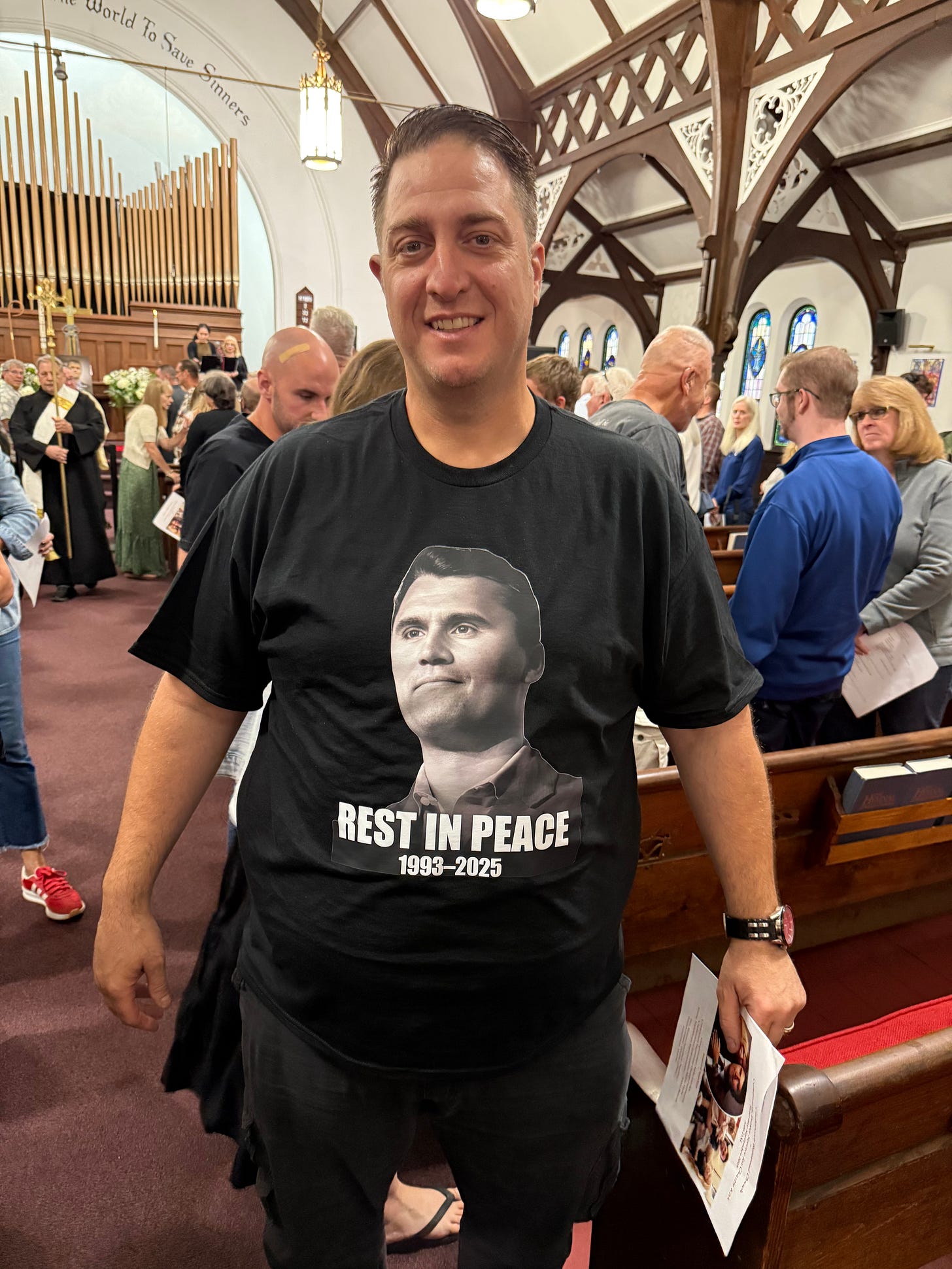
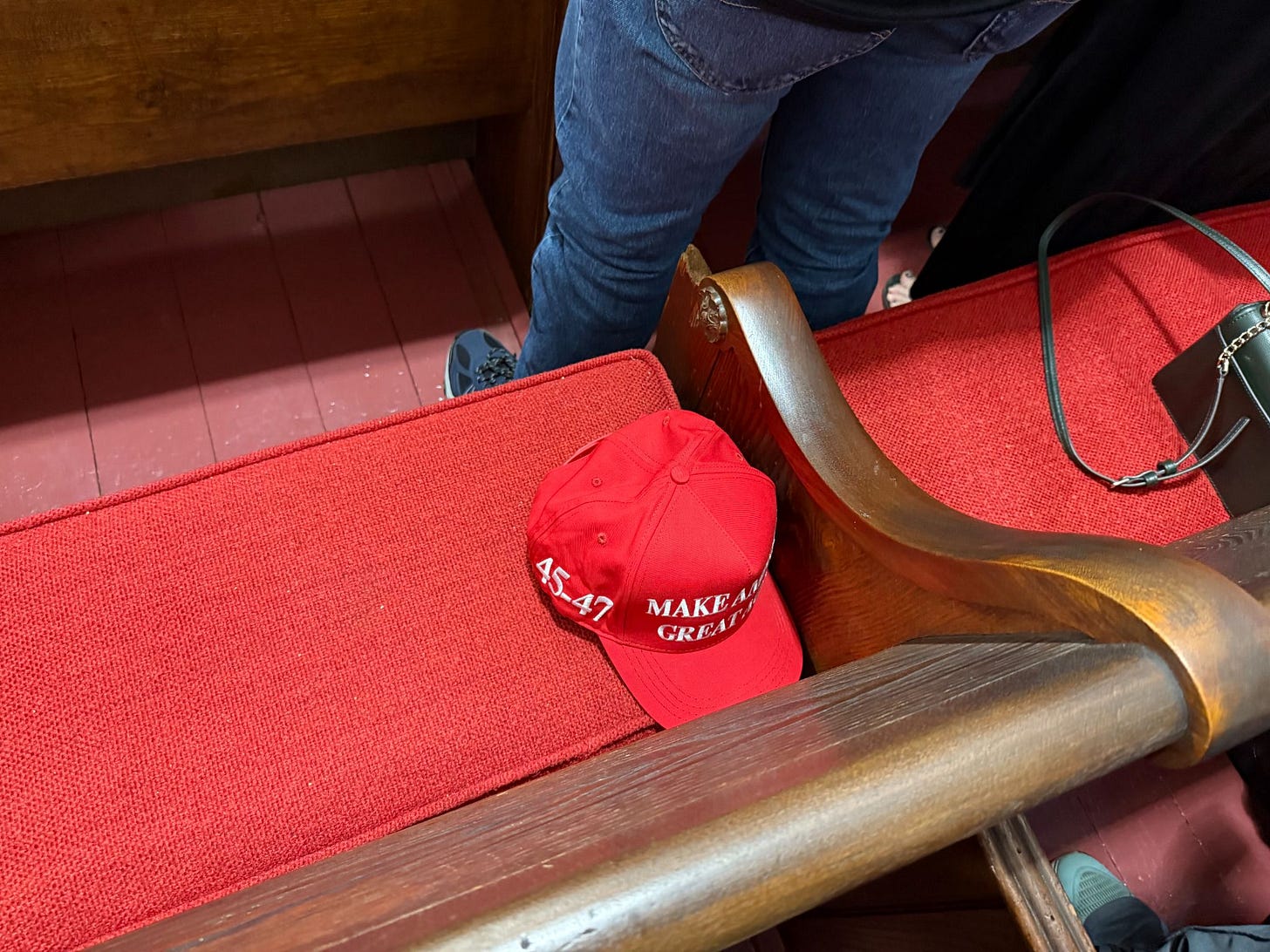
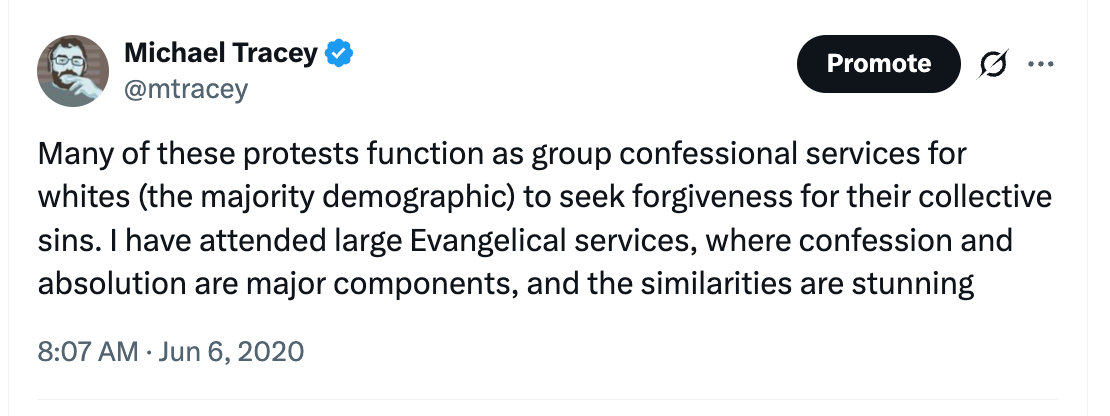
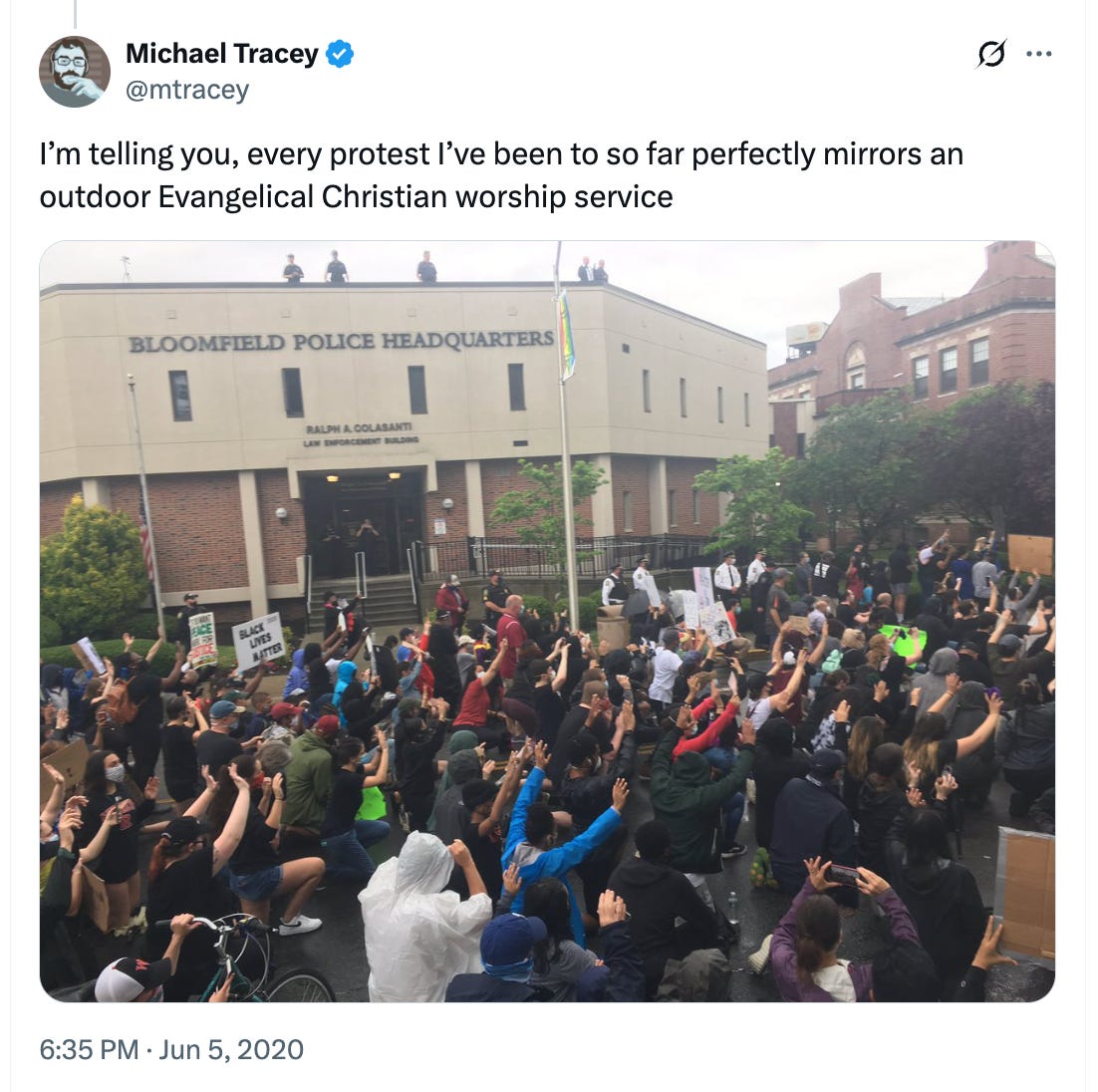
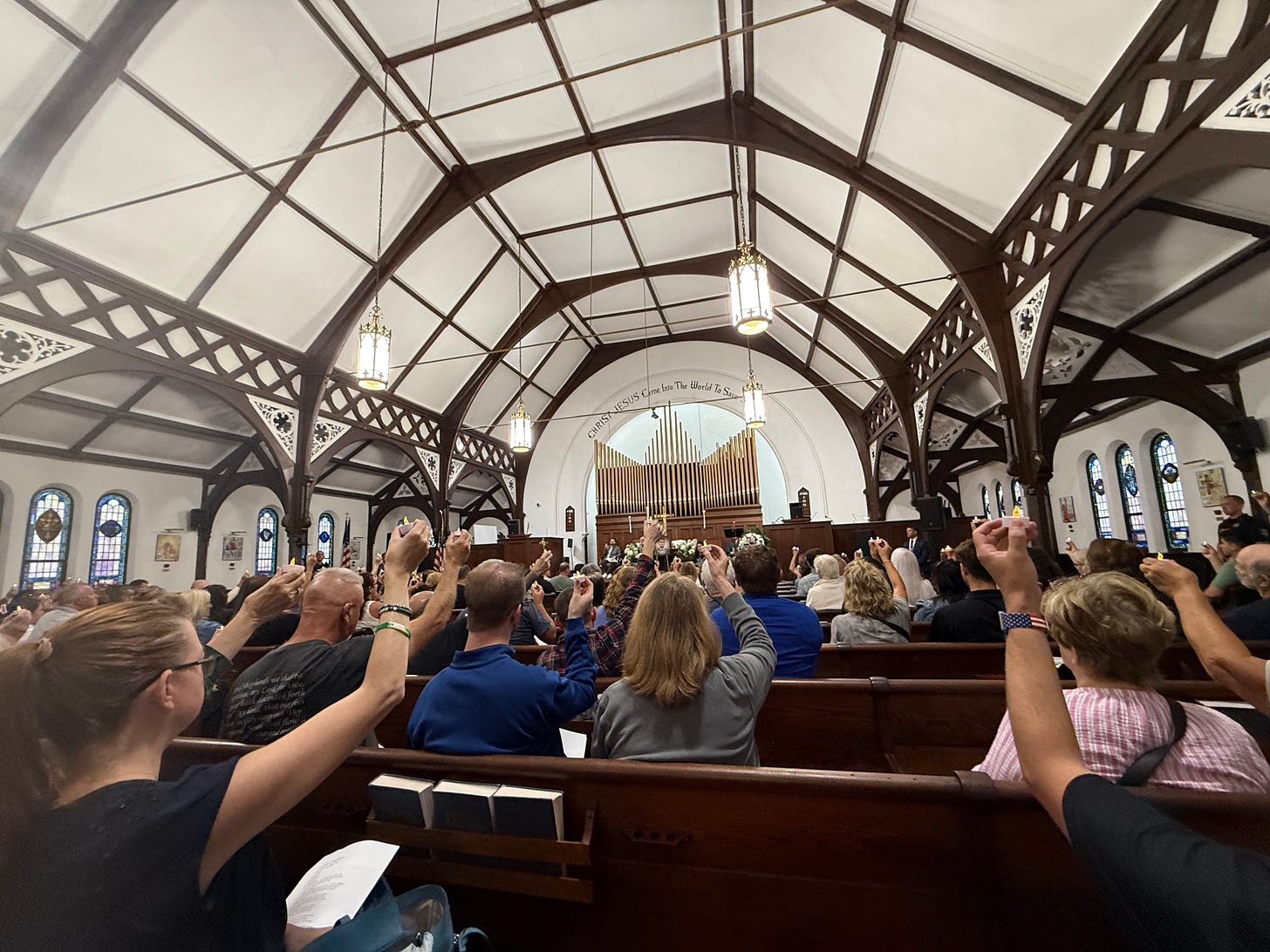
Merching her husband at his so-called memorial service: Erika Frantzve Kirk works through the third stage of the Five Stages of Grift.
Other possible components
-Take the focus off/move forward away from Charlie’s murder itself with all its inconsistencies and implausibilities to the spiritual revival…
Likely anyone who questions the official government FBI-version will be labeled a conspiracy theorist…..
Ironic that Charlie would mention fear of Israel and then end up dead. Although nothing ties Israel to the murder they are professionals at their craft. Direct links are not probable. It may take years to unravel the mystery and then zero consequences for anyone.
-Attempt to introduce censorship, Pam Bondi among others, for wrong think/hate speech. Something Charlie was dead against.
Ironic that the government/UniParty would use Charlie’s death to promote censorship. They are Opportunists first. What Charlie represented means nothing to them. They never miss an opportunity to prosecute the real agenda. Now we know censorship is not just a Democratic agenda but a UniParty agenda. If censorship laws are ever implemented every comment potentially will become hate speech to silence people or comments. Orwell’s 1984